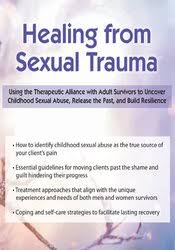HEALING FROM SEXUAL TRAUMA: USING THE THERAPEUTIC ALLIANCE WITH ADULT SURVIVORS TO UNCOVER CHILDHOOD SEXUAL ABUSE, RELEASE THE PAST, AND BUILD RESILIENCE – GERMAYNE BOSWELL TIZZANO
Your work is crucial to ending the pain of adult clients who come to you with depression, suicidal thoughts, post-traumatic stress disorder, addictions, and chronic health conditions.
But the source of your client’s suffering may not always be clear – silent and full of shame and guilt, survivors of childhood sexual abuse sometimes hide their traumatic past, thus frustrating your efforts to find the root of their problems. By focusing primarily on the more tangible symptoms, you could be missing the critical element you need to move therapy forward.
Through informed and uplifting didactic exercises, case examples and lectures, this seminar will show you how to establish a safe place for clients to confront the harm that has been done and to heal and restore a healthy sense of self. You will explore clinical interventions to support recovery, self-care, and transformation. Get ready to experience numerous breakthroughs with your clients, first in helping them acknowledge the source of their conflict and confusion and then giving them a clear vision of how to move forward and live full, meaningful lives.
- Analyze how to recognize signs of childhood sexual abuse in the narratives offered during sessions by adult clients.
- Determine clinical strategies to mitigate potential neurobiological effects of sexual trauma.
- Apply essential guidelines for establishing an effective therapeutic alliance with adult survivors.
- Explore treatment options to help adult survivors navigate difficult realities resulting from childhood sexual abuse.
- Differentiate the impact of sexual trauma on men and women survivors and the related clinical implications.
- Utilize clinical tools and resources to help adult survivors build resilience.
Helping Clients Confront Past Sexual Abuse
- Childhood sexual abuse vs. other forms of sexual trauma
- Definition, magnitude, perpetrators, circumstances, risk factors, signs of abuse
- Listen to the narrative
- The nuances of survival, resilience, and hope
Sexual Trauma, Neurobiology, and Implications to Work with Survivors
- Neurological impacts of sexual abuse
- Long-term behavioral, emotional, and physical effects of trauma
- Body, trauma, and sexuality – Lessons from the perpetrator
Establishing a Therapeutic Alliance with Survivors
- Effective guidelines for the therapeutic relationship in trauma work, safety and containment
- Critical components to assess
- Treatment objectives, phases, and the healing process
- Comparative look at clinical interventions
- Evolving practices of clinical interventions for survivors
Strategies for working with Survivors
Helping Survivors Navigate Difficult Realities
- Complexities of sexual trauma, addiction, and sexuality
- Re-victimization and recycling of abuse
- Compulsion to repeat – domestic violence/intimate partner violence
- Subsequent challenges in sexual intimacy and interpersonal relationships
- Trauma and drug-linked triggers
Treating Men and Women Survivors
- Key differences/similarities in men’s and women’s experiences with sexual trauma
- Different responses and approaches to working with men and women survivors
- Redefine masculinity and examine sex positive approaches to working with women survivors
Building Resiliency
- Chronicling significant events that shape sexual values, attitudes, and beliefs
- Psycho-education, wellness, coping and self-care strategies
- Therapeutic tools and resources for recovery
Application of Clinical Knowledge with Case Examples
- Reflections and implications for your clinical work




